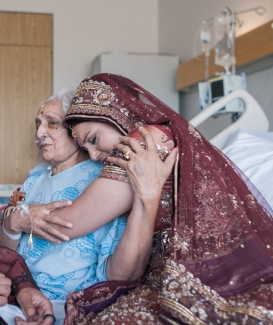Lay Science Writing Competition winner: Is TACO best eliminated with Lasix (TACO-BEL)?
Monday, February 24, 2020 Dr. Aditi Khandelwal
On my wedding day, my grandmother was admitted to the hospital for pneumonia. Unfortunately, patients over the age of 50 years old (and especially those over 70 years old), such as my grandmother, have higher needs for support with blood products. Older patients are also more vulnerable to the side effects of transfusion. My husband and I went to get my grandmother’s blessings immediately after getting married. Here, we faced an interesting challenge. I witnessed a fellow physician attempting to get my grandmother’s permission for a blood transfusion. I found myself torn between being a compliant family member and a physician, trying not to be too critical of my well-meaning colleagues. I realized that the discussion never mentioned a risk for Transfusion Associated Cardiac Overload (TACO). Since TACO is the most common serious side effect of transfusion, accounting for 32% of transfusion associated deaths, I felt that I must ask the doctors caring for my grandmother to consider the risk when administering the transfusion. Being elderly, with lung problems, I knew my grandmother was at a high risk of TACO. I asked if the prescribing doctor could use a medication called Lasix. Experts recommend use of Lasix to help the blood vessels adjust to the sudden increase in volume of fluid as well as help remove extra fluid. The doctors caring for my grandmother agreed with my suggestions. On more rigorous search of existing studies, however, I realized that there were no randomized controlled studies (RCT) to support this common practice.
A year later, my supervisors conducted the first pilot RCT, called TACO BEL, to determine whether a large trial assessing the effectiveness of Lasix in TACO prevention is possible. Subsequently, I completed a feasibility study to look at ten large hospitals across Canada and determine whether we can meet the recruitment goals to rigorously test our theory.
My study has shown that a larger RCT will be possible. It will take 18 months to reach our recruitment targets. At the 10 hospitals, we found that 11969 red cell units were transfused over 1 month. Based on review of patient charts, we estimate that the 10 sites will be able to identify 858 eligible patients per month. Only 20% of eligible patients agreed to participate in the pilot study. Even with this low rate of consent, we can recruit 172 participants per month. We also found that a quarter of the eligible participants had a history of heart failure which is an important risk factor for TACO. Also, a quarter of the patients were prescribed Lasix. During this review, 3 (5.3%) cases of TACO were reported. This rate is slightly higher than expected from previous pilot study.
Over time, the use of Lasix before transfusion has increased. Soon, we hope to perform a large RCT to test if Lasix does indeed help prevent TACO and help make transfusion safer for our patients, family and friends.
About the winner
Dr. Aditi Khandelwal completed medical school at McGill University, and Internal Medicine and Adult Hematology training at University of Toronto. She is now a Transfusion Medicine trainee at Canadian Blood Services, based at University of Toronto. She is also a M.Sc student in Systems Leadership and Innovation, at Dalla Lana IHPME, University of Toronto. Her clinical and research interests are promoting women's health, peri-procedural hemostasis and transfusion safety. Currently, she is completing research projects supervised by Dr. Matt Yan, Dr. Michelle Zeller, Dr. Chantale Pambrun, Sylvia Torrance, Dr. Jeannie Callum, Dr. Jacob Pendergrast, Dr. Lani Lieberman and Dr. Gwen Clarke.
The 2019-2020 Canadian Blood Services Lay Science Writing Competition was organized by the Canadian Blood Services’ Centre for Innovation with welcome support from Science Borealis and the Centre for Blood Research at the University of British Columbia.
Canadian Blood Services – Driving world-class innovation
Through discovery, development and applied research, Canadian Blood Services drives world-class innovation in blood transfusion, cellular therapy and transplantation—bringing clarity and insight to an increasingly complex healthcare future. Our dedicated research team and extended network of partners engage in exploratory and applied research to create new knowledge, inform and enhance best practices, contribute to the development of new services and technologies, and build capacity through training and collaboration. Find out more about our research impact.
The opinions reflected in this post are those of the author and do not necessarily reflect the opinions of Canadian Blood Services nor do they reflect the views of Health Canada or any other funding agency.
Related blog posts
The Centre for Innovation is delighted to announce the winner of the 2019-2020 Canadian Blood Services Lay Science Writing Competition. Read on to find out who won and when you can read their heartfelt winning entry.
Stories underlie all research experiences, but these stories are rarely told. The Centre for Innovation is excited to launch its second annual Lay Science Writing Competition and give our research trainees the chance to tell those stories!
The results of our first-ever Lay Science Writing Competition are in, read-on to discover who gets top-prize and what happens next.


